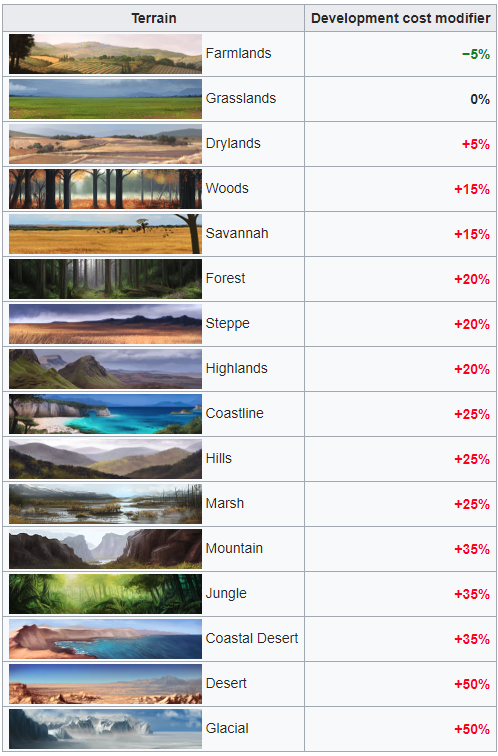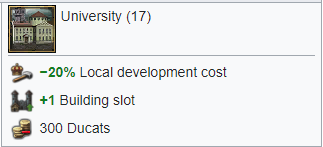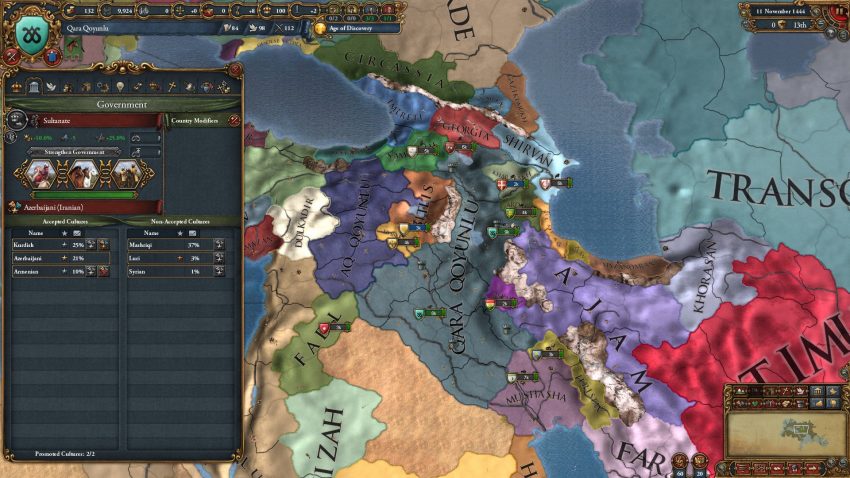This guide is about getting the maximum development cost reduction possible, so developing your provinces is cheap and nice for institutions. You will have to develop if you’re playing outside of Europe, if you want to keep up in tech. This guide will look at the best ways to achieve the maximum development cost reduction.
Introduction
Welcome to my guide about dev cost reduction. This guide aims to teach you on how to get the maximum reduction. There’s many ways to get it, such as religion, ideas, and estates. I will firstly go over the routes most players will take, then I’ll talk about some more specific cases, such as Amsterdam.
Why develop a province?
There are a multitude of reasons for developing a province. It is important to get maximum efficiency out of developing, and here I will cover some reasons as to why you should do it.
1) Institutions
Each time you do a dev click, the province gains points towards an institution (firstly taking the ones it doesn’t have yet, so if both renaissance and colonialism has spawned, and the province has neither, it will gain renaissance progress first). This is very useful when playing outside europe, where it’s really hard to get the first three institutions, because they spread so slowly.
2) Gold mines
Gold may be the main source of income in the early game for many nations, especially poor asian/african ones. Thus you can use your monarch points to develop a gold mine, giving you more money. You should develop their Base Production with diplomatic points, which adds to the mine’s productivity.
3) Trade power, tax money, manpower
Developing directly increases tax money (base tax), trade power and goods produced (base prod), and manpower (base mil). If you have a province with a very good permament modifier, or you just want to get more of one of those things, it’s certainly worth clicking that develop button a few times.
There are other reasons to develop provinces, such as expanding your power base if you’re an OPM. All in all, development can be pretty worth it, especially if you’re playing tall.
Why is it important to stack these modifiers?
Because the development cost of a province increases as you develop it more.
The cost to develop provinces increases by +3% per point above 10 total development. This modifier itself increases by 3 for every 10 total development.
Your monarch power is precious and you should try to conserve it as much as possible.
All images are credit to the EU4 wiki and the Europa Universalis IV game
Terrain
Terrain is the most important part of developing a province. Before developing, you must pick a province with the best terrain, before factoring in other things. The best terrain type is Farmlands, which gives -5% development cost. You can see all the development cost modifiers by terrain in the image below.

The best terrain type for development is Farmlands, which gives a -5% development cost (all other terrain types, except grasslands, add to development cost instead of reducing it). Grasslands is also a decent terrain type for developing, as it doesn’t have any development cost penalty.
Drylands adds a 5% dev cost penalty, though it isn’t as bad. You can develop on a drylands province if you don’t have any grasslands or farmlands (or alternatively, you have a grasslands province, but the drylands province has either Cloth or Cotton).
The worst provinces for development are Glacial (really rare) and Desert, both giving a 50% development cost penalty. These provinces are really costly to develop in, and oftentimes not recommended.
A province might also have climate modifiers. There are three, and they’re all negatives. Tropical and arid give a 15% dev cost penalty, while arctic gives a huge 50% penalty.
Province and state modifiers
In this section, I will cover provincial and state modifiers, such as trade goods, edicts and more.
Provincial modifiers
There’s two trade goods that give -10% development cost in the province – Cloth and Cotton. It’s worth looking for provinces with these trade goods, so that you can get the cheapest development cost possible.


Centers of Trade (CoTs) are also a very important thing. It costs 200 ducats to upgrade one to Level 2, giving you trade modifiers and -5% development cost, and 1000 ducats to upgrade it to Level 3, giving you -10% development cost.

Since you have read the first section, I will now name the provinces that have Farmlands, Cloth/Cotton and a Center of Trade:
Lublin, Baghdad, Macedonia, Cairo (high dev – not worth developing), Regensburg, London, Milan (high dev – not worth developing), Prague and Amsterdam (I’ll talk about this in the last section).
If you have the trade bonus for trading in Tropical Wood, it gives you -5% more development cost.

Additionally, capital cities get development cost reduction based on the development of the entire nation – the more development your nation has, the cheaper it is to develop in the capital. It is -5% development cost per 100 development, up to -50% development cost (at 1000 development).
State modifiers
If you have the province in a state, you can use the Encourage Development edict in the state, giving you -10% development cost.
If the province has no devastation, and you have positive stability, you can gain progress to prosperity. Prosperity is really strong, giving you -10% development cost and 25% goods produced modifier.
If you have a trade company, you can’t use edicts or have prosperity, however, one of the trade company upgrades gives -15% development cost to the entire state (doesn’t matter who owns the rest of the provinces).
Religion
Religion is another big modifier for developing provinces. Many religions have bonuses that give you development cost modifiers. Religion is important if you want to get the maximum dev cost reduction.
All of the dev cost modifiers by religion:
Protestant – Organized through bishops aspect gives -5% dev cost, costs 100 church power.
Orthodox – Icon of Christ Pantocrator gives -10% dev cost (and -10% construction cost), costs 10 Patriarch Authority.
Anglican – 10% development cost as one of the religion’s tenets.
Muslim religions – Maliki school gives -10% dev cost, you need to either be a maliki nation yourself, or ally/have a subject maliki nation, and have them at atleast 150 relations, which then costs 50 admin points to get.
Shinto – Adaptive Isolationism level gives -10% dev cost. Japanese nations start at Adaptive, can change through Incidents.
Tengri – Theravada syncretic faith gives -10% dev cost.
Fetishism – Buddhist cult gives -10% dev cost.
There’s 2 estates that give direct development cost modifiers, one is for Indian nations, one is for everyone else.
Burghers
Burghers are the merchant estate for non-Indian nations. If the Burghers are over 60 loyalty and over 75% influence, they will give a -10% development cost modifier.
![]()
Vaishyas
Vaishyas are an estate for Indian nations. If the Vaishyas control a province, and they are over 60 loyalty, the province gets -20% development cost.
![]()
The Renaissance institution, when embraced, gives -5% development cost. The province that spawns it gets -5% development cost as well.
Development Efficiency is the most important modifier for developing provinces, as they affect the base cost of developing a province. At techs 17, 23, 27, you get -10% development efficiency.
Tech 17 also unlocks the Universities building, which gives a huge -20% development cost modifier to the province that has the building. It is worth building them in provinces you plan to develop.
Ideas
Another modifier to development costs is ideas. Many nations get ideas, traditions and ambitions that give them -10% development cost (Prussia is the only nation that gets -5%, but comes with a +1 tolerance of heretics). A full list can be found on the EU4 Wiki. They include Milan, Naples, Switzerland and Holland/Netherlands among others.
The Economic Ideas finisher grants you a huge -20% development cost modifier, while coupling the group with Quantity ideas gives an extra -10% development cost modifier.
This section will cover all the other things that can effect your development cost.
Amsterdam
the Holland/Amsterdam province gets an unique decision for Holland/Netherlands “Land Reclamation in Holland”, which gives -25% development cost in the province (keep in mind this province is a farmlands cloth CoT already) for the cost of 100 admin power. It’s a really strong modifier, which makes it the single best province to develop in the game. However, I have seen an event which gives the province the trade good Paper, which takes away the cloth dev cost modifier, so that can hapepn.
Parliament
Nations with a parliament can have the parliamentary issue “Land Reform”, which gives -10% development cost.
Holy Roman Empire
The first reform of the HRE, “Call for Reichsreform”, gives -5% dev cost and -5% construction cost to all members of the HRE, with the emperor getting an extra -5%.
Additionally, Free Cities of the Holy Roman Empire have a -10% development cost modifier.
Empire of China
If you spend your meritocracy on the “Expand Palace Bureaucracy” decree, your empire will get -10% development cost and -10% core cost reduction.
Feudal Theocracy
If you use the “Invite Minorities from Abroad” action as a Feudal Theocracy, you get -20% development cost in your capital area and +1 random development in your capital area for 5 years, at the cost of 50 diplomatic power. Feudal Theocracy is available to a few muslim nations, and by forming Persia/Sokoto.
Missions
Many missions in the game give development cost modifiers to specific provinces, capital provinces, and entire nations. The generic mission tree has a mission that grants -10% development cost in the capital.
Government Reforms
Two Indian government reforms give -5% development cost, one for muslims and one for hindus.
Mughal Diwan
Assimilating the South-East Asian culture group gives you -5% development cost.
Natives
Per 500 natives left in a colonized province, the province gets -1% development cost.
Notes
Firstly, after successfully developing a province to an institution, it should be around 35 development, if not more. That means that developing another institution there would be incredibly inefficient, so I don’t advise to develop more than one institution in one province.
If you’re developing a province for an institution, the optimal development for it before developing is at 14-17 development.
I suggest fully coring (and converting if necessary) the province before developing it, as doing otherwise may result in higher coring costs.
There’s a handy list of all the modifiers on the EU4 Wiki[eu4.paradoxwikis.com].
List of modifiers
−5% in the capital province per 100 country development (up to −50%)
−20% if a Latin university.png University is built in the province
−20% in Capital area, with Invite Minorities from Abroad action as Government monarchy.png Feudal Theocracy
−10% if province trade good is Cloth or Cotton (requires Rights of Man.png)
−10% with the decree “Expand Palace Bureaucracy” active, available to the Emperor of China
−10% with parliamentary issue “Land Reform” active
−10% as an Imperial Free City
−10% if Burghers are at Estate loyalty 60 loyalty and Estate influence 60 influence (lower at less influence)
−10% as Orthodox with Icon of Christ Pantocrator active
−10% as Muslim with Maliki school followed or invited.
−10% as Shintoism Shinto with Adaptive Isolationism level
−10% as Tengri with Theravada as syncretic faith
−10% as Fetishist with Buddhism cult
−10% with Anglican religion
−10% with Encourage Development edict
−10% with Prosperity
−10% if the state the province is in has a level 3 Center of Trade, a “World Port” or “World Trade Center”.
−5% if the province is a level 2 Center of Trade, an “Entrepot” or “Market Town”.
−5% with “Trading in Tropical Wood” bonus
−5% as Protestant with “Organized through bishops” aspect active
−5% for members of the Holy Roman Empire, if the “Call for Reichsreform” reform is passed
−5% for embracing the Renaissance.png Renaissance institution
−1% per 500 natives left alive in a colonized province
+0.1% per 1% of devastation
+0.5% as Confucianism Confucian for each point of Harmony less than 50 (up to +25%)
+50% for being a primitive nation
+50% for being a subject nation
-20% if you have completed the Economic idea group
-10% from Economic + Quantity policy “Agricultural Cultivation”
-10% from various national ideas
-5% from Prussian national ideas
-5% from Mughal diwan bonus after assimilating South East Asian culture
-5% with the Noble Privileges reform tier reforms “Sufi-Syncretism” or “Empower the Poligars”
-5% with the Theocracy Divine Cause tier reform “Expulsion of Heathens”
Related Posts:
- Europa Universalis IV: Console Commands [2019]
- Europa Universalis IV: Cherrypicking Achievement Guide
- Europa Universalis IV How to Fix Game Crashing on Launch (New DLC)
